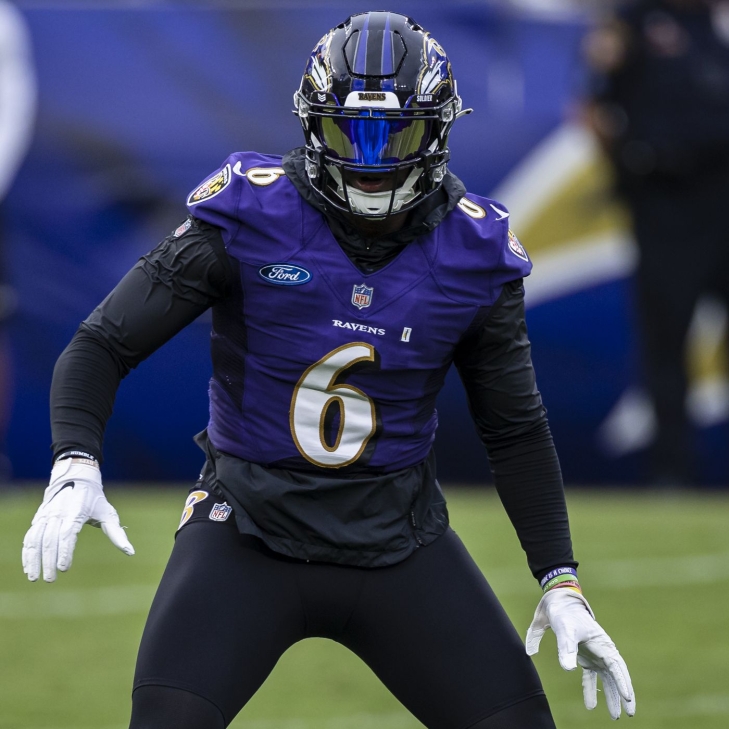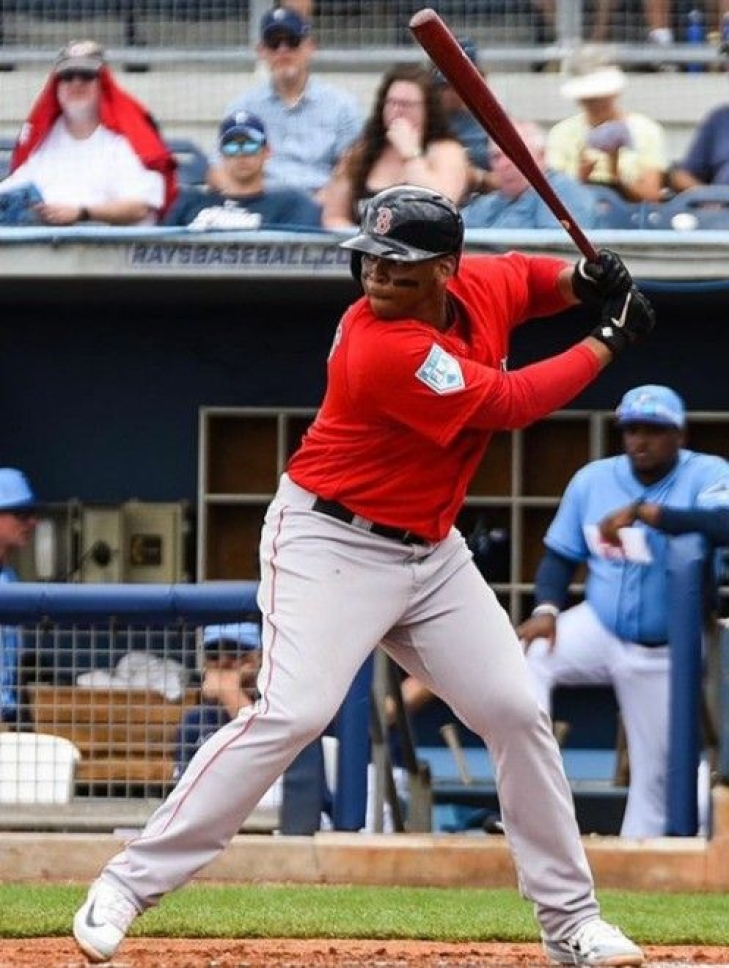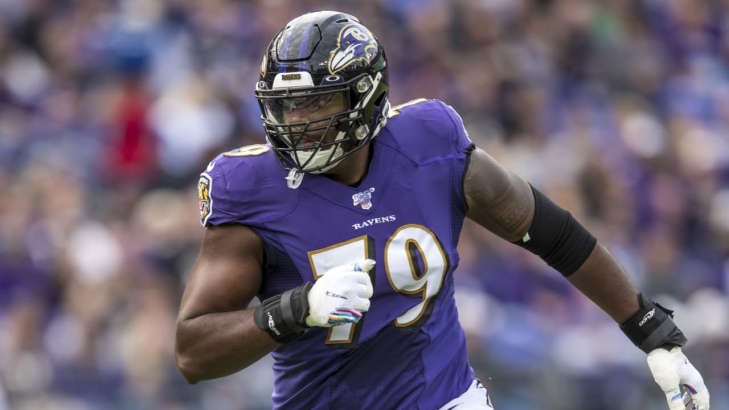
Committee Chairman
Players Who Made History for the Rams: From Eric Dickerson to Aaron Donald
If you are a Rams fan, you will know they have a decorated history, with the team producing some of the best players the NFL has ever seen. The Rams have won one Super Bowl and two NFL Championships since the franchise joined the NFL in 1973. And throughout history, the Rams have competed in four Super Bowls and, most recently, the Super Bowl LIII.
Many great players have donned the horns over the years. And the Rams have sent many players to the Pro Football Hall of Fame. So far, the franchise has boosted 21 Hall of Famers, and 19 are players. And with the anticipation of Iowa sports betting promo codes lingering in the air, let’s relish in the nostalgia as we explore the top 10 Rams players of all time.
1. Aaron Donald - 2014
Aaron Donald is a defensive player for the Rams drafted in 2014. And during his tenure, the Pittsburgh alum took the league by storm, becoming a threat to any quarterback. His quickness, capacity to read the offense and strength make Aaron a freak athlete.
In 9 seasons playing as a pro, Aaron was selected seven times to the First-Team All-Pro and eight times to the Pro Bowl. He was also a three times NFL Defensive Player of the Year and instrumental to the Rams Super Bowl LVI championship.
2. Marshall Faulk - 1998
Marshall Faulk is one of the greatest running backs in the Ram's history. The San Diego State alum drafted to the Rams in 1998 is the only running back to win the NFL MVP in Rams history.
His impact on the team was immediate, as he won the NFL Offensive Player of the Year award in his first three seasons. Marshall's third season as a member of the Rams was his best, as he played a crucial role in the franchise's first Super Bowl title.
3. Isaac Bruce - 1994
Isaac Bruce is one of the top offensive players in the history of the Rams. Drafted in 1994, Marshall broke many records from 1999 to the 2001 seasons. Notably, he was instrumental in Ram's victory in the XXXIV Super Bowl Championship.
Also, in 14 seasons between the Los Angeles Rams and St. Louis, Isaac picked up over 14,000 total yards, making him a Pro Bowler roster four times. He is also in the top five for receiving yards in NFL history.
4. Kurt Warner - 1994
Kurt Warner is often regarded as among the best-undrafted players in NFL history. He was the quarterback of The Greatest Show on Turf, where he contributed to the win in the XXXIV Super Bowl and MVP award. Kurt played at Northern Iowa for four years before going undrafted in 1994.
After this, he spent three years in the Indoor Football League and one year in NFL Europe with a Rams future contract. And in 1999, Kurt earned his chance with the Rams, taking the league by winning the NFL MVP award.
Also, he led the league in passing touchdowns, making it to the First-Team All-Pro in his first full season. 2000 after winning the Super Bowl, Kurt won another MVP award and was again selected to the First-Team All-Pro.
5. Eric Dickerson - 1983
Eric Dickerson is one of the greatest running backs in NFL history. Eric was drafted second overall in 1983, becoming a nightmare for any defense. Following his draft, he won the NFL Offensive Rookie of the Year Award in 1986.
He played five out of his twelve seasons as a pro with the Rams. Eric has also established the record for most rushing yards in the rookie season. Eric has also been awarded the First-Team All-Pro award five times, the NFL rushing leader four times, Pro Bowler six times, and an NFL 100th Anniversary team member.
Conclusion
The Los Angeles Rams history is a collection of extraordinary players that have etched their names in football history. Each player on this list has bought their unique playing skills and contribution to the table that has helped shape the identity of the Rams. And beyond the accolades and statistics, the Rams icons have become a symbol of perseverance and inspiration.
43. Patrick Queen
Patrick Queen won a National Championship with LSU in his last NCAA Game, where he was named the Defensive MVP. Months later, he was one many Tigers who were taken in the NFL Draft (28th Overall), and he did not waste time establishing himself in the elite football league.
Queen won the starting job at Linebacker as a rookie, dominating the interior for the Ravens, with a 106 Tackle year. He was named an All-Rookie, and after a solid second year, Queen set a then personal best with 117 Tackles in 2022. Entering 2023 as a possible All-Pro, Queen did just that as a Second Team All-Pro with his first Pro Bowl Selection, and increased his stats to 133 Tackles.
Sadly for the Ravens, Queen signed with their division rival, Pittsburgh for 2024. Queen accumulated 454 Tackles in four years.
July 4 Update: Notinhalloffame MLB Cup Standings.
It is with great pleasure that we continue the third annual Notinhalloffame MLB Regular Season Cup, and let us explain how this works:
With every single regular season game, we anointed the best five players in the game with descending points, 5-4-3-2-1.
We knew the following:
- The top players for the MLB NIHOF Cup are not always the best in the league, as injuries keep players out of games, and a premium on staying healthy can help pile up points. It also does not hurt to be a top player on an average or mediocre team, as they can amass Cup points easier that elite players on loaded squads.
- In Baseball, it is more common than in Basketball and Hockey for a player to accrue points with a single Home Run in a game, and overall favors position players. Starting Pitchers have a hard time with approximately 30-35 Starts and throwing less innings than in previous generations. This also is true for closers, which is not made for this process.
- Please remember, that this is NOT necessarily who we think were the best players this year, and does not reflect overall consistency. Treat this the way did, as a fun process and more of a compilation of temporary statistical domination.
At present 886 (up from 865 last week) Players have generated at least one Cup Point.
So, MLB players! Get your agents to work winning this into your contracts!
This is the eighth update, with standings as of the morning of July 4.
1. Shohei Ohtani: Los Angeles Angels, Designated Hitter & Pitcher: (Ranked #1 last week)
142 Cup Points, 85 Games, 1.67 Cup Points per Game, 31 Home Runs, 68 Runs Batted In, 11 SB, .303/.390/.664, 6.7 bWAR & 7-3, 3.02 ERA, 127 SO, 1.038 WHIP.
The Notinhalloffame Cup is built for Ohtani, who can compile points in two different avenues; the only one who can do so. Ohtani has been brilliant this week, and the chasm between the top spot and second spot continues to grow. He is off to a good pitching start, leading the AL in H/9 (5.7), SO/9 (12.0) and is second in Strikeouts (127). With his bat, Ohtani is the current American League leader in Home Runs (31), Triples (5), Slugging (.664), OPS (1.054), OPS+ (183) and Total Bases (217), whie also being second in RBIs (68), third in OBP (.390) and seventh in Batting (.303). The AL MVP is his to lose.
2. Ronald Acuna: Atlanta Braves, Outfield: (Ranked #2 Last Week)
113 Cup Points, 84 Games, 1.35 Cup Points per Game, 21 Home Runs, 54 Runs Batted In, 40 SB, .335/.413/.599, 4.9 bWAR.
Acuna leads all National League batters in Stolen Bases (40), Runs Scored (77), Slugging (.599), OPS (1.012), OPS+ (168) Total Bases (202) and bWAR (4.9). He is also second in Batting (.335), and fourth in OBP (.413).
3. Rafael Devers: Boston Red Sox, Third Base: (Ranked #6 Last Week)
94 Cup Points, 81 Games, 1.16 Cup Points per Game, 20 Home Runs, 66 Runs Batted In, 1 SB, .256/.326/.505, 1.8 bWAR.
Devers remains a surprise as he vaulted back to #3. #6 and is currently third in the AL in RBIs (60) and fourth in Home Runs (20).
4. Juan Soto: San Diego Padres, Outfield: (Ranked #3, Last Week)
93 Cup Points, 85 Games, 1.10 Cup Points per Game, 15 Home Runs, 46 Runs Batted In, 6 SB, .277/.426/.500, 3.7 bWAR.
Soto is still the National League leader in Walks (77) and is second in OBP (.426) and OPS (.926). He is also fourth in bWAR (3.7), OPS (.927).
5. Matt Olson: Atlanta Braves, First Base: (Ranked #8 Last Week)
91 Cup Points, 84 Games, 0.96 Cup Points per Game, 28 Home Runs, 68 Runs Batted In, 1 SB, .250/.354/.571, 1.8 bWAR.
Olson is on fire and has the National League lead in both Home Runs (28) and RBIs (68). He is also second in Slugging (.571) and third in OPS (.925).
6 (TIE). Mookie Betts: Los Angeles Dodgers, Outfield: (#10, Last Week)
90 Cup Points, 77 Games, 0.96 Cup Points per Game, 22 Home Runs, 56 Runs Batted In, 7 SB, .268/.371/.550, 3.8 bWAR.
Betts had a phenomenal week, where he moved up to eighth in bWAR (3.6), fifth in Slugging (.550) and sixth in OPS (.920). He is also in the top four in both Home Runs and Runs Batted In.
6 (TIE). Luis Arraez: Miami Marlins, Second Base: (#4, Last Week)
90 Cup Points, 80 Games, 1.13 Cup Points per Game, 3 Home Runs, 41 Runs Batted In, 1 SB, .388/.438/.479, 3.7 bWAR.
Arraez is flirting with a .400 Batting Average and he is currently the National League leader in Hits (119), Batting Average (.388) and On Base Percentage (.438). He also has a very impressive Slugging Percentage (.479) for a player with only three Home Runs.
8. Corbin Carroll: Arizona Diamondbacks, Outfield: (Ranked #7, Last Week)
86 Cup Points, 80 Games, 1.08 Cup Points per Game, 17 Home Runs, 44 Runs Batted In, 24 SB, .289/.365/.557, 3.7 bWAR.
Carroll is running away with the National League Rookie of the Year Award, and it is only July! At present, the young Outfielder is seventh in the National League in bWAR (3.7), and is in the top ten in Batting Average (.289), OBP (.365), Slugging (.557), Runs (60), Home Runs (17) and Stolen Bases (24).
9. Jorge Soler: Miami Marlins, Outfield & Designated Hitter: (#5, Last Week)
84 Cup Points, 75 Games, 1.12 Cup Points per Game, 22 Home Runs, 47 Runs Batted In, 1 SB, .242/.338/.513, 1.2 bWAR.
Soler is playing more and more at DH this year, but he is providing the Marlins incredible offense. He is third in NL Home Runs (22), and sixth in Championship WPA (1.4).
10. Marcus Semien: Texas Rangers, Shortstop: (Ranked #9, Last Week)
81 Cup Points, 77 Games, 0.97 Cup Points per Game, 11 Home Runs, 56 Runs Batted In, 9 SB, .283/.347/.456, 3.6 bWAR.
Semien is having an outstanding 2023, though he has substantially cooled off in the last month. He is the current AL leader in Runs Scored (67) and is fourth in bWAR for Position Players (3.6).
Houston’s Alex Bregman fell out of the top ten.
Our next update will be the afternoon of July 10.
19. Ronnie Stanley
Ronnie Stanley was the first Offensive Lineman taken in the 2016 Draft, and though he may not be the most outstanding O-Lineman of his draft class, but he has proved solid over his career.
Earning the starting Left Tackle job as a rookie, Stanley’s first three years were decent, but his fourth year was incredible, where he went to the Pro Bowl and was a First Team All-Pro. Stanley’s 17 in Approximate Value was also good enough for fourth in the NFL.
Stanley was hurt for most of 2020 and 2021, dealing with ankle issues, but he returned in 2022 during the regular season, stayed healthy throughout the rest of the year, and had a bounce-back 2023, which was followed by a Pro Bowl (his second) in 2024.
Stanley enters 2025 as a nine-year veteran who is still a starter.





